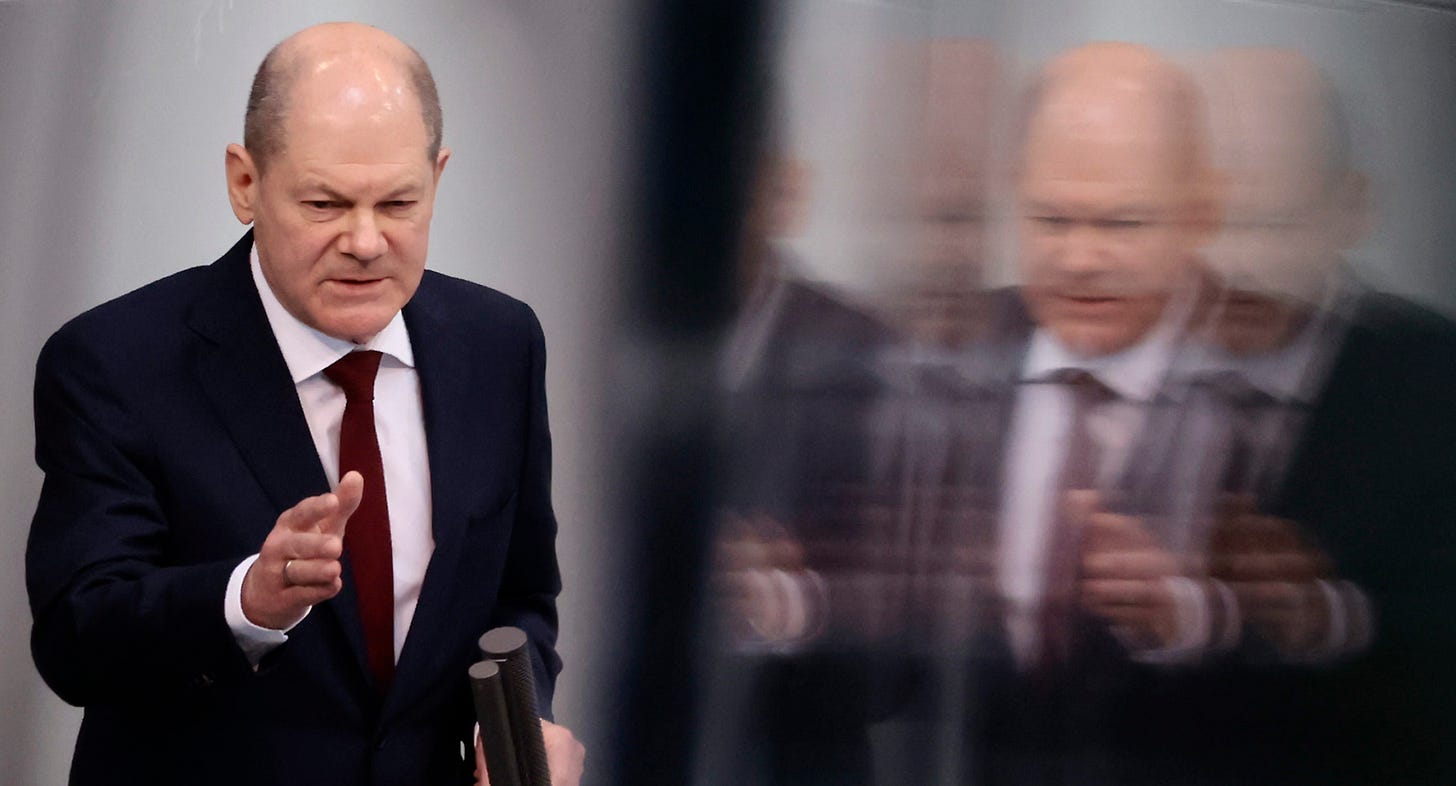What Changed Germany’s Mind
Chancellor Olaf Scholz’s decision to give weapons to Ukraine overturned decades of tradition.

Yesterday, German Chancellor Olaf Scholz declared that Germany would henceforth spend more than two percent of its GDP on defense, a longstanding and long-avoided NATO demand. This came after Saturday’s equally stunning announcement that Germany would send 1,000 anti-tank weapons and 500 Stinger missiles to Ukraine. With Scholz’s decision, the largest economy and most influential country in the EU has redefined its role in European security. The effects may be felt for years.
The new German chancellor was responding, of course, to Russia’s unprovoked invasion of Ukraine, which he called a “turning point” and a threat to “our entire post-war order.” But Scholz was also responding to widespread criticism from Germany’s European allies over its unwillingness to join, and even obstruction of, other NATO partners’ efforts to arm Ukraine. Most incredibly, Germany refused Britain use of its airspace to deliver Javelin anti-tank missiles to Ukraine.
Yet Germany had its reasons. Unlike other European countries, Germany and Russia fought a war with each other in Ukraine 80 years ago. In the course of that war, which was also fought throughout what historian Tim Snyder has called the “Bloodlands” of Eastern Europe, Germany lost an estimated 4.3 to 5.3 million soldiers and the Soviet Union an estimated 8.7 million. In the Battle of Stalingrad alone, Germany and Russia each lost far more soldiers fighting one another than the United States lost in all theaters throughout the entire war.
Hence Germany’s special sensitivities regarding Russia and military intervention in Ukraine. Given West Germany’s thorough effort after World War II to atone for its sins and set in place strict rules to prevent a repeat of the tragedies that Germany inflicted and suffered, it never fully rearmed and subsumed itself within NATO. Since German reunification in 1991, facilitated by Soviet leader Mikhail Gorbachev, the united Germany has acted with extreme care and even solicitude toward Russia. In doing so, it was willing to overlook a lot of bad behavior on the Russian side.
As Steve Szabo has demonstrated, German policy toward Russia emphasized economic ties in the hope of tying the two countries together in peaceful coexistence. Germany financed Russian economic development and created new markets for German goods. The Munich-based manufacturing and engineering conglomerate Siemens, for instance, provides the high-speed trains that dart between Moscow and St. Petersburg. The idea was nicely summed up in the German phrase Wandel durch Handel, or change through trade. The expectation was that a wealthier Russia would gradually become more politically integrated with Europe.
But Germany’s desire to see reform in Russia led to its warm embrace of Dmitri Medvedev, who was nominally the leader of Russia from 2008-2012 when he served as president. (The real power followed Vladimir Putin from the presidency to the premiership.) German Chancellor Angela Merkel and other German leaders were taken in by the smooth, relatively liberal-seeming Medvedev and chose to ignore Putin’s 2007 Munich Security Conference speech in which he declared the end of the U.S. unipolar order, the massive cyberattack on Estonia later that year, Russia’s invasion of Georgia in August 2008, and myriad other signs that Russia had launched a hybrid war on the West.
Germany only began to wise up in 2011-2012, when Russia repressed the Bolotnaya protests and Putin returned to the presidency. Merkel and other European leaders seemed shocked and disappointed. However, it was only really after Russia’s 2014 invasion of Crimea and downing of the civilian airliner MH-17 that Merkel declared Putin to be “living in another world” and initiated economic sanctions on Russia in the context of the European Union. Even then, Germany did everything it could to reduce the possibility of a conflict in Ukraine by negotiating and endorsing the absurd Minsk protocols, which were extremely unfavorable to Ukraine, but seemed a reasonable price to pay for peace—at least to Germany.
Until yesterday, Germany remained extremely reluctant to create even the faintest appearance that it was threatening Russia militarily—hence its refusal even to allow overflight rights to NATO allies exporting arms to Ukraine. For its own domestic and moral reasons, Germany needed to be a peacemaker to the last.
Putin’s blatant and unprovoked assault on Ukraine changed that calculus. Now, no one in their right mind could possibly blame Germany, so it is finally safe to act. Germany can play a key role as a supporter of Ukraine, both by sending arms to help the poor people in Kyiv and throughout the country and by rearming itself, as Scholz has promised to do, to meet the obvious threat from Russia.
The new era has long been coming. For years, Germany’s leaders, committed to good relations, studiously refused to treat Russia as a threat, but rather as a potential partner. Putin made it easy for them to change their minds.

